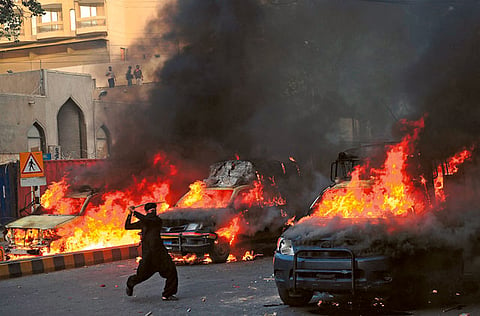Many killed in Pakistan as fresh anti-Islam film protests erupt in Muslim world
In Mideast and Asian countries tens of thousands took to the streets to vent their anger

Islamabad: Fresh protests erupted across the Muslim world on Friday against a US-made film and French cartoons mocking Islam, with violent demonstrations in Pakistan leaving at least 16 people dead.
In Middle Eastern and Asian countries tens of thousands took to the streets after the main weekly prayers to vent their anger, with little sign that the angry protests which began 11 days ago would abate.
Western missions were shut across the Islamic world, fearing further escalation of the backlash over the low-budget film "Innocence of Muslims" that has spread across the world.
France, where a magazine this week published a series of cartoons mocking the Prophet Mohammad (PBUH), has shut embassies, consulates, cultural centres and schools in 20 Muslim countries, fearing the fury will spread from US targets.
Pakistan bore the brunt of the anger on Friday, with huge crowds of demonstrators throwing stones and setting buildings ablaze to denounce the film.
There were clashes in the country's five largest cities leaving 16 dead and almost 200 others wounded, as protesters defied government calls for peaceful demonstrations on what was declared a national holiday.
Witnesses estimated that nationwide rallies mobilised more than 45,000, mainly members of right-wing religious parties and supporters of banned terror groups, although the numbers were still small in a country of 180 million.
Police fought back with gunshots and tear gas as arsonists and looters attacked cinemas, banks, shops and restaurants in Karachi, where outbreaks of political and ethnically-linked violence have killed hundreds this year.
Two cinemas were also torched and ransacked in the northwestern city of Peshawar, on the edge of tribal belt strongholds of the Taliban and Al Qaida. In Karachi, a policeman who died after being shot when officers used tear gas to disperse a crowd near the US consulate was among nine people killed in the country's largest city. Four people were killed in Peshawar, including the driver for a TV channel which blamed police for his death.
Police and paramilitary troops deployed en masse fired off volleys of tear gas to hold off protesters from breaching barricades that sealed access to Western embassies and consulates.
In Islamabad gunshots were also fired outside the five-star Serena Hotel and police baton-charged some 8,000 protesters trying to penetrate the heavily-guarded diplomatic enclave. Protestors threw stones, shouting "Americans are dogs" and "Friends of America are traitors", while setting fire to an effigy of a nameless American.
The government had declared Friday a "day of love for the prophet", but for hours shut down mobile telephone networks in an apparent bid to prevent extremists from exploiting the protests to carry out bomb attacks. "It is our collective responsibility to protest peacefully without causing harm or damage to life or property," said Prime Minister Raja Pervez Ashraf as shops, markets and petrol stations shut en masse in an unprecedented closure.
Washington has warned citizens not to travel to Pakistan and spent $70,000 to air TV adverts in the country disassociating the US government from the film. While the protests turned ugly in Pakistan, in other Muslim countries demonstrations were not as violent as had been feared.
In the Arab world, Muslims took to the streets of Lebanon, while there were also demonstrations in Basra in south Iraq and in the Yemeni capital Sanaa. Tunisia had banned all demonstrations amid fears of violence and Libya's second city Benghazi braced for rival demonstrations by a jihadist militia and its opponents.
Tensions are still running high after a deadly attack on the US consulate in the city last week which left Ambassador Chris Stevens and three other Americans dead. The White House says the FBI suspects Al Qaida may have been linked to the attack, but it remains unclear whether it was a pre-planned assault or whether it sprang out of a protest against the film.
There were also demonstrations across Asia in Indonesia, Malaysia, Japan and Bangladesh, where about 10,000 took to the streets of Dhaka to condemn the film and the French cartoons. US interests bore the brunt of protests against the film.
After French satirical weekly Charlie Hebdo printed anti-Islam cartoons, the government said it would deny requests to protest against the film and news of the cartoons appeared slow to filter to the Islamic world. The magazine's editor, Stephane Charbonnier, mocked those angered by the cartoons as "ridiculous clowns" and accused the French government of pandering to them by criticising the magazine for being provocative.
Sign up for the Daily Briefing
Get the latest news and updates straight to your inbox



